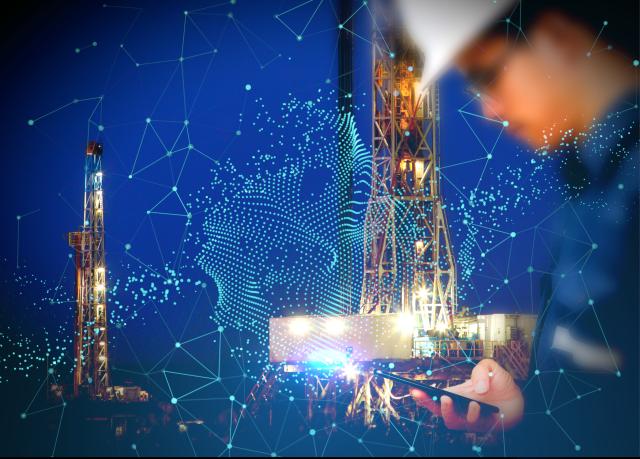
(Source: Hart Energy; Shutterstock.com)
For the last few years, “digital transformation” have been buzzwords throughout the oil and gas industry. A key component of the digital transformation is the emergence of cloud computing, which has enabled the industry to harness the combination of Big Data, scientific knowledge and domain expertise to make large-scale petrotechnical applications and workflows accessible to all users. The Industrial Internet of Things (IIoT) and edge computing are the next emerging areas of digital transformation for oil and gas field operations. These innovative technologies are enabling the use of machine learning and artificial intelligence-based applications at the edge. “The edge” refers to the edge of the network. In the oil and gas industry, the edge is the field, and edge devices are the sensors, controllers, actuators and other various types of surface and downhole equipment used in field operations.
The large amounts of data generated from field operations—upward of 2 TB/day at a single well site in some cases—present challenges when it comes to data transmission, storage and analysis, due to low bandwidth and latency. Without any data contextualization in the field, operators are faced with significant costs to transmit large datasets to the enterprise. This challenge is compounded when considering the remoteness of oil and gas operations, many
of which rely on satellite communication for connectivity. Because of this, the industry is not leveraging all the data generated at the well site, thus leaving opportunity for significant improvement.
Powerful edge computing enables the ability to analyze data in the field, where the data are generated. By analyzing the data in the field, only relevant, actionable insights are sent back to the enterprise, resulting in significant reductions in data transmission and storage costs.
The true value of edge computing, however, is the ability to create intelligence from high-frequency data and enabling the ability to act in real time. In the past, field visits were required to check field equipment and make adjustments. Performance-boosting edge applications can be used to remotely perform corrective actions or enable actions to be performed autonomously. As a result, unnecessary trips to the field are eliminated, safety exposure and environmental impacts are reduced, and operational efficiency and productivity are enhanced.
There are three main pillars for a high-performing edge computing ecosystem: openness, security and scalability. Openness refers to multiple facets, including the ability to acquire data generated by edge devices from any manufacturer and the ability to transmit that data into either open data ecosystems or to proprietary data ecosystems. Through openness, oil and gas operators can utilize edge computing and the IIoT to perform remote operations from large data environments—in conjunction with autonomous operations at the edge—to create a distributed intelligence environment.
Edge computing in the oil and gas industry must be secure, by design and in operation, from the edge to the cloud to the enterprise. Bringing edge devices online, which have traditionally been isolated from corporate IT environments, greatly expands the threat landscape. As such, hardware, software and data access and transmission must be fully secure.
Scalability, the third pillar, refers to an edge computing platform’s ability to manage the complexity of the oil and gas industry. The platform must first be built upon domain expertise and operational experience, both of which are unique to the oil and gas industry.
By driving dynamic intelligence to the edge via an open, secure and scalable edge computing platform, the industry can achieve a significant step forward in operational efficiency, enhance productivity, and minimize safety exposure and the overall environmental footprint.
Sujit Kumar has spent the last two decades on the leading edge of global oilfield innovation. As Agora president and CEO, he spearheads the startup’s efforts to maximize the power of edge intelligence for the oil and gas industry. Throughout his career, Kumar has explored the intersections of oilfield operations, technology, marketing and culture. Before leading Agora, he served as Schlumberger’s RGG marketing and technology director in Paris, France.
Recommended Reading
EIA: NatGas Storage Plunges, Prices Soar
2025-01-16 - Frigid weather and jumping LNG demand have pushed natural gas above $4/MMBtu.
US NatGas Prices Retreat From 2-Year Peak on Forecasts of Less Cold
2024-12-26 - U.S. natural gas futures fell more than 5% on Dec. 26 from a near two-year high in holiday-thinned trade.
Expand CFO: ‘Durable’ LNG, Not AI, to Drive US NatGas Demand
2025-02-14 - About three-quarters of future U.S. gas demand growth will be fueled by LNG exports, while data centers’ needs will be more muted, according to Expand Energy CFO Mohit Singh.
Segrist: American LNG Unaffected by Cut-Off of Russian Gas Supply
2025-02-24 - The last gas pipeline connecting Russia to Western Europe has shut down, but don’t expect a follow-on effect for U.S. LNG demand.
US NatGas Prices Jump 9% to 26-Month High on Record LNG Flows, Canada Tariff Worries
2025-03-04 - U.S. natural gas futures jumped about 9% to a 26-month high on record flows to LNG export plants and forecasts for higher demand.
Comments
Add new comment
This conversation is moderated according to Hart Energy community rules. Please read the rules before joining the discussion. If you’re experiencing any technical problems, please contact our customer care team.



